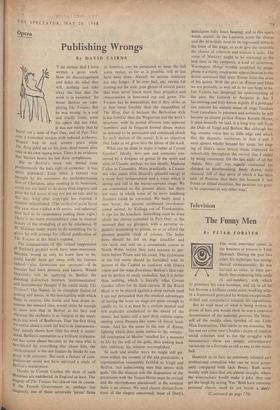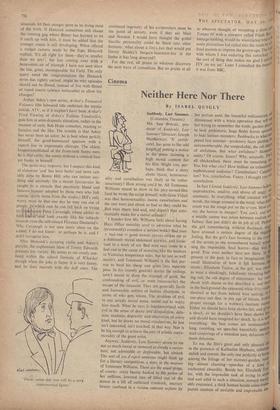Television
The Funny Men
By PETER FORSTER But to read most of what is being written in praise of him, one would think he was a common denominator of the national persona, the Mitty- self of the middle class, symbol of our Little Man frustrations, This seems to me nonsense. He has not yet come near Chaplin's depth of implicit social criticism, and as for the struggles with bureaucracy—these are simply contemporary variations on a formula as old as any in the music hall.
Hancock is, in fie, an extremely talented and professional comedian who can be most accur- ately compared with Jack Benny. Both score mainly with lines that are almost straight; where the wisecrackers would make a joke, they can get the laugh by saying `Yes.' Both have immense personal charm, need to act inside a story-
(Continued on page 736) situation, let their stooges seem to be doing most of the work. If Hancock sometimes still chases the running gag where Benny has learned to let it catch up with him, it must be added that the younger comic is still developing. When offered a midget camera made by the Japs, Hancock replied, 'It's all right for them—they're smaller than we are!', the line coming over with a benevolent air of triumph I have not seen since the late, great, incomparable Sid Field. The only query amid the congratulations the Hancock series has rightly earned, might be why episodes should not be filmed, instead of live with filmed or taped inserts (always noticeable) to allow for changes?
Arthur Askey's new series, Arthur's Treasured Volumes (the laboured title enshrines the mystic initials ATV, as if it mightn't have been Arthur's Tired Viewing or Askey's Tedious Vaudeville), puts him in semi-dramatic situations, rather in the manner of early Bob Hope comedies, reacting to lunatics and the like. The trouble is that Askey has never been an actor; he is best when perkily himself, the good-humoured sparrow with a superb line in impromptu chirrups. The oldest, longest-established of the front-rank funny men, he is that rarity, the comic without a comical face yet funny in himself.
The series may improve, but I suspect this kind of elaborate 'cod' has been better and more suit- ably done by Benny Hill, who can imitate any- thing and anybody. (In a recent Spectacular he caught to a miracle that peculiarly bland and fatuous manner adopted by those men who link outside'Snorts items from the studio.) Hill's only worry must be that one day he may run out of people.ln which case hesan fall back on trying to iiiTilifsonate Peter Cavanagh, whose ability to both Wad and look exactly like his subjects exceeds even the still-missed Florence Desmond's. Why Cavanagh is not seen more often on the screen. I do not know : or perhaps he is, and I don't recognise him.
After Hancock's scraping violin and Askey's piccolo, the euphonium blast of Jimmy Edwards presents less variety. He seems to me overly con- fined within the school formula of Whacko! though when the joke is funny it is very funny, and he does marvels with the duff ones. The 'Oscar, some day you will be a very controversial figure.' continued ingenuity of his scriptwriters must be the point of anxiety, even if they are Muir and Norden. I would have thought the grand bucolic personality could be fitted into other formats: what about a Jim's inn that would put Jimmy Hanley's bargain-basement-bar in the limbo it has long deserved?
For the rest, all praise to whoever discovers the next wave of comedians. But no praise at all to whoever thought of mounting a show c'"'i Tempo 60 with a compere called Frank 130,,,' teenage-looking, would-be wisecracker who is some precocious kid called into the room bY°'011 fond parents to impress the grown-ups. Theft i) with whom I was enduring this remarked, .4 the sort of thing that makes me glad can tr ITV on my set.' Later I consulted the man°ii it was from BBC.







































 Previous page
Previous page